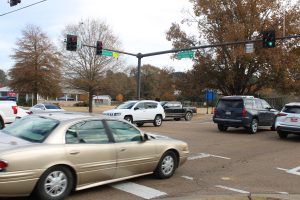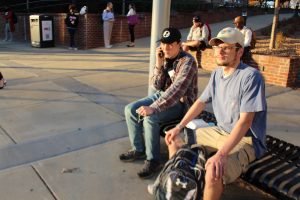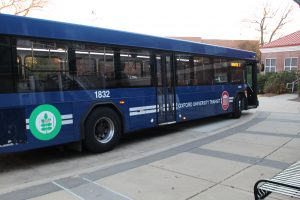By Cameron Smith and Loral Winn
MISSISSIPPI – Residents in Mississippi struggle to get to work, doctor’s appointments, and grocery stores due to a lack of transportation.
Lack of Public Transportation
Public transportation is scarce in rural Mississippi. Due to the fact that there are little to no public transit services throughout the state, residents who do not own a car struggle to travel to and from places without needing to rely on a family member or friend for a ride. Not to mention, most cities are located 20 miles or more away from each other, making it even more difficult to travel without some form of transportation.
Corey Miller is the state of Mississippi economist and director of the University Research Center. Miller evaluates the economic status of the state and says transportation is limited outside of the metropolitan area in the state.
“There are very few parts of the state where you have public transportation, you have some here in the Jackson area, and maybe some on the coast and south of Memphis. Beyond that there is not much in terms of transportation options in the state particularly for low income people,” said Corey Miller
A study conducted by the Federal Highway Administration shows how many residents have transportation per 100 people in the state of Mississippi. Upon analyzing the data, Miller said, “Mississippi had 27.1 vehicles registered per 100 residents, which ranked 49th among all states and the District of Columbia.”
“The average for the whole U.S. was 33.2,” said Miler according to Federal Highway Administration
[infogram id=”transportation-1hd12yxl73v3w6k?live”]
Living in a low economic area restricts residents from being able to build up a good credit score. Opportunities to build up credit are few when jobs are scarce.
“You still have some people who are particularly low income people who don’t trust working with banks and financial institutions,” said Miller.
There are residents who do not have personal transportation but possibly have transportation through a relative. The cost of paying a relative for means of transportation is more expensive than the cost of gas to fill up a personal vehicle. It is more of an inconvenience to plan a schedule around a relative to get them where they need to be. Personal transportation saves time, money, and simply makes life easier. They also might have to contact multiple people in their family or close friends nearby to find someone who is able to fit them into their schedule.

Personal transportation plays important role to improving health.
Dr. Anne Cafer is a Sociology professor and director for the Center of Population Studies at the University of Mississippi. She researches nutrition and chronic conditions in the state and focuses mainly on obesity and diabetes in Mississippi residents.
“What we found is that a lot of particularly elderly patients are having to spend their benefits. So usually SNAP benefits, to purchase food for the person who drives them. Every time they go to the grocery store, they are spending 20 bucks of their monthly benefits just to get to the grocery store,” said Anne Cafer.
How Health is Affected
The economic status of residents in Mississippi is low compared to surrounding states which prohibits them from having a means of personal transportation. The average household income for 2019 was around $46,000 and Mississippi was around $3,000 below the national average putting the state in last across the country.
“Poverty rate in Mississippi, averaged over the last 3 years, was almost 19%, which was the highest among all states in 2019,” Said Miller.
The Mississippi Delta has been one of the poorest economic regions across the state and the country. 30% to 40% of all counties in the Delta are made up of residents living in poverty.
“We had the Casino industry come in the 1990’s. That helped some counties along the Mississippi River, that has actually shrunk some reaching years of competition in other parts of the country,” said Miller.
Over time, agriculture has moved from less manual labor to more technology and machinery. Farmers have made this move because it is cheaper for them because they save money on labor. As a result of this, business owners are moving away from the Delta. Such a decrease in job opportunities hurts residents who live in the Delta because their chances of finding economic stability are now being taken away.
“One thing that has happened in the agricultural economy is we have seen a lot of consolidation. Farms have gotten larger, so you have got deeper people owning more of the industry. We have seen the cities in the Delta, the towns in the delta get smaller as well,” said Miller.
There is not much opportunity for transportation in Mississippi with the exception of those who live in Jackson, Mississippi who have access to a public transportation service. Likewise, residents who live in Oxford have access to the Oxford University Transit that will take them to grocery stores. The only stop that is not on any of the routes in Oxford is a stop to a doctors office.

From left, University of Mississippi sophomores Jackson Strickland and Jonathan Clayton wait on the Oxford University Transit.
“Lack of income means a continuation of the systemic problems the state has faced for a long time. I would point out that a lack of income is the result of a lack of economic growth,” said Miller.
Living in a rural area takes a toll on someone’s overall health. Transportation plays an important role in our health like using it to get to a grocery store to purchase fresh fruit and vegetables that offer nutrients that the human body needs. Going to a grocery store that offers fresh produce is vital because these items cannot be found at local Dollar Generals. Secondly, having transportation is important to health because it allows residents to travel to the doctors office for check ups, surgeries, or cancer screenings to make sure their body is functioning properly.
To determine if someone is considered impoverished, the state looks at how many people are living in a household as well as the household income. The total household income for a family of four is going to be greater than household income for a household of one.
“Those numbers change every year and they tend to vary on household size,” said Miller
Ways to Improve Access to Transportation in Mississippi
In Jackson, MS, they have a public transportation system called the J tram for residents to use to get around the city. In Coahoma County, Mississippi, there is a transportation service called Dart. Their main focus has been on health care and getting residents to doctors appointments. The service also transports people to jobs to earn a living and at one point allowed people to ride the transportation service to do grocery shopping.
However, transportation is not readily available in all other parts of the state. Solving the transportation problems is going to require more than non-profit organizations providing transportation services. Rural Mississippi is in desperate need of a full-time transportation system that is reliable and can transport residents wherever and whenever they need to travel.

Oxford University Transit transports residents around the city of Oxford.
In terms of the future for Mississippi, it is apparent that the state needs to figure out a way to address the transportation crisis. In doing so, the state will create an opportunity for it’s overall health to improve greatly.
“I think there’s lots of avenues to address these issues. It won’t be just a blanket policy that solves it. It’s going to be working creatively and innovatively at state and local levels to address these bottlenecks,” said Dr. Cafer.
